Karthik Elamvazhuthi
@clopenloop.bsky.social
Hobbyist in control theory and optimal transportation. Gets high on probability densities and the heat equation.
https://hackmd.io/@clopenloop
https://sites.google.com/view/karthikelamvazhuthi
https://hackmd.io/@clopenloop
https://sites.google.com/view/karthikelamvazhuthi
The road to the maximum principle turns out to be more non-smooth than one might expect.
Boltyanski, Martini & Soltan’s book ( Geometric Methods and Optimization Problems) has far more drama than you’d guess from the Sussmann–Willems survey.
Boltyanski, Martini & Soltan’s book ( Geometric Methods and Optimization Problems) has far more drama than you’d guess from the Sussmann–Willems survey.



October 31, 2025 at 5:24 PM
The road to the maximum principle turns out to be more non-smooth than one might expect.
Boltyanski, Martini & Soltan’s book ( Geometric Methods and Optimization Problems) has far more drama than you’d guess from the Sussmann–Willems survey.
Boltyanski, Martini & Soltan’s book ( Geometric Methods and Optimization Problems) has far more drama than you’d guess from the Sussmann–Willems survey.
Job season in academia can take a toll on confidence, identity, and energy. You’re not alone.
Sometimes it helps to zoom out.
Hunter Wapman’s thesis highlights some interesting hiring patterns:
www.hne.golf/static/pdfs/...
Non-US trends may differ, perhaps shaping distinct knowledge bubbles.
Sometimes it helps to zoom out.
Hunter Wapman’s thesis highlights some interesting hiring patterns:
www.hne.golf/static/pdfs/...
Non-US trends may differ, perhaps shaping distinct knowledge bubbles.


October 24, 2025 at 4:54 PM
Job season in academia can take a toll on confidence, identity, and energy. You’re not alone.
Sometimes it helps to zoom out.
Hunter Wapman’s thesis highlights some interesting hiring patterns:
www.hne.golf/static/pdfs/...
Non-US trends may differ, perhaps shaping distinct knowledge bubbles.
Sometimes it helps to zoom out.
Hunter Wapman’s thesis highlights some interesting hiring patterns:
www.hne.golf/static/pdfs/...
Non-US trends may differ, perhaps shaping distinct knowledge bubbles.
Multi-agent control often feels like control theorists doing dynamical systems instead of control theory. What if we posed it like classic control problems.
Collective decision-making as feedback stabilizability. Turns out, it leads to a strange kind of control problem.
hackmd.io/@clopenloop/...
Collective decision-making as feedback stabilizability. Turns out, it leads to a strange kind of control problem.
hackmd.io/@clopenloop/...
October 16, 2025 at 11:10 PM
Multi-agent control often feels like control theorists doing dynamical systems instead of control theory. What if we posed it like classic control problems.
Collective decision-making as feedback stabilizability. Turns out, it leads to a strange kind of control problem.
hackmd.io/@clopenloop/...
Collective decision-making as feedback stabilizability. Turns out, it leads to a strange kind of control problem.
hackmd.io/@clopenloop/...
A basin of attraction

October 8, 2025 at 4:33 PM
A basin of attraction
We adapt flow matching to measure transport in control systems.
We also introduce a control-oriented version of denoising. No classical white noise needed.
Uncertainty flows through the (sub-Riemannian) exponential map or via regular (but random) controls.
www.researchgate.net/publication/...
We also introduce a control-oriented version of denoising. No classical white noise needed.
Uncertainty flows through the (sub-Riemannian) exponential map or via regular (but random) controls.
www.researchgate.net/publication/...

(PDF) Flow Matching for Measure Transport and Feedback Stabilization of Control-Affine Systems
PDF | We develop a flow-matching framework for transporting probability measures under control-affine dynamics and for stabilizing systems to points or... | Find, read and cite all the research you ne...
www.researchgate.net
October 5, 2025 at 12:12 AM
We adapt flow matching to measure transport in control systems.
We also introduce a control-oriented version of denoising. No classical white noise needed.
Uncertainty flows through the (sub-Riemannian) exponential map or via regular (but random) controls.
www.researchgate.net/publication/...
We also introduce a control-oriented version of denoising. No classical white noise needed.
Uncertainty flows through the (sub-Riemannian) exponential map or via regular (but random) controls.
www.researchgate.net/publication/...
An interesting result on how LQ problems in optimal control can fail to have minimizers: arxiv.org/pdf/1311.200... (in an almost merciless way).
September 24, 2025 at 4:16 PM
An interesting result on how LQ problems in optimal control can fail to have minimizers: arxiv.org/pdf/1311.200... (in an almost merciless way).
Spot the pika.

September 24, 2025 at 2:45 AM
Spot the pika.
Optimal Transport (OT) is emerging as a versatile tool for control questions. We show an OT-based way to sample from the reachable set (RS), especially useful when systems have strong attractors.
www.researchgate.net/publication/...
RS of Van der Pol vs. naive random sampling (below).
www.researchgate.net/publication/...
RS of Van der Pol vs. naive random sampling (below).
September 21, 2025 at 5:09 PM
Optimal Transport (OT) is emerging as a versatile tool for control questions. We show an OT-based way to sample from the reachable set (RS), especially useful when systems have strong attractors.
www.researchgate.net/publication/...
RS of Van der Pol vs. naive random sampling (below).
www.researchgate.net/publication/...
RS of Van der Pol vs. naive random sampling (below).
Collaborator-in-chief

September 2, 2025 at 4:35 PM
Collaborator-in-chief
Finally, my YouTube debut! A recording of my talk at the AI and data seminar series organized by the Automatic Control Engineering Network.
m.youtube.com/watch?v=o-4B...
Here I pontificate on using time reversals of diffusions for stabilization and planning problems.
m.youtube.com/watch?v=o-4B...
Here I pontificate on using time reversals of diffusions for stabilization and planning problems.
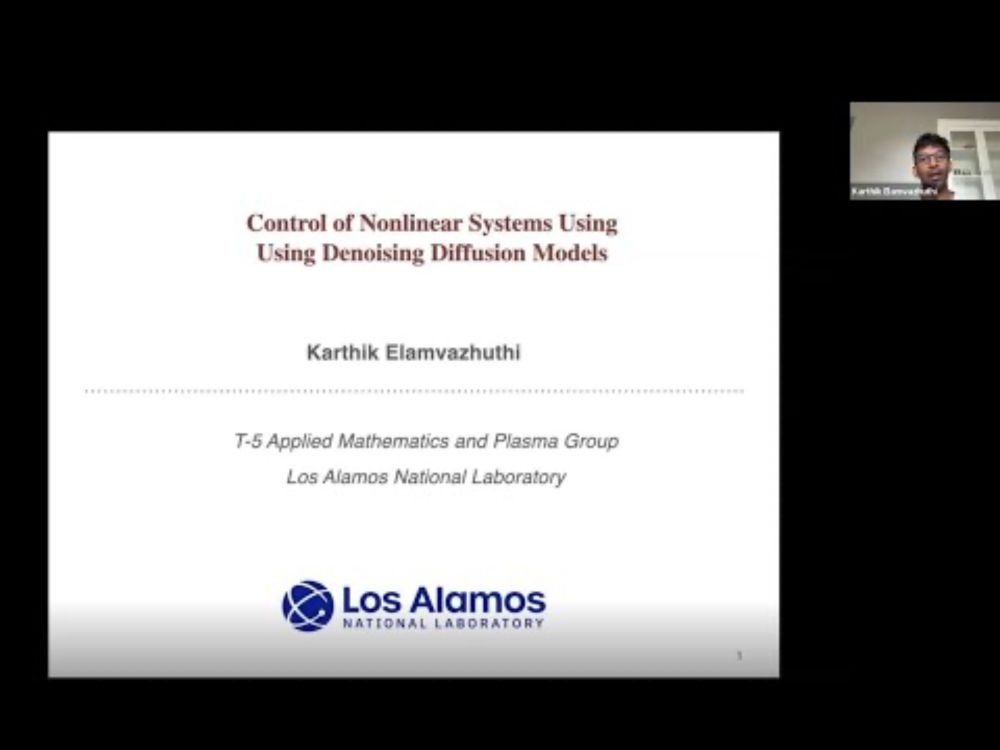
ACE AI and Data Talk Series-Dr. Karthik Elamvazhuthi
YouTube video by Automatic Control Engineering Network (ACE)
m.youtube.com
July 19, 2025 at 2:22 AM
Finally, my YouTube debut! A recording of my talk at the AI and data seminar series organized by the Automatic Control Engineering Network.
m.youtube.com/watch?v=o-4B...
Here I pontificate on using time reversals of diffusions for stabilization and planning problems.
m.youtube.com/watch?v=o-4B...
Here I pontificate on using time reversals of diffusions for stabilization and planning problems.
I am starting to compile some notes on Generative Modeling for Control Theory. The goal is to include topics such as degenerate Fokker-Planck equations (FPEs) and Optimal transport theory. Here is a first post on the classical (nicer) FPE and its long-term behavior.
hackmd.io/@clopenloop/...
hackmd.io/@clopenloop/...
June 30, 2025 at 12:33 AM
I am starting to compile some notes on Generative Modeling for Control Theory. The goal is to include topics such as degenerate Fokker-Planck equations (FPEs) and Optimal transport theory. Here is a first post on the classical (nicer) FPE and its long-term behavior.
hackmd.io/@clopenloop/...
hackmd.io/@clopenloop/...
Probably a good chapter if it starts with Nietzsche.
- Tanja Eisner, Bálint Farkas, Markus Haase and
Rainer Nagel (Operator Theoretic Aspects
of Ergodic Theory)
- Tanja Eisner, Bálint Farkas, Markus Haase and
Rainer Nagel (Operator Theoretic Aspects
of Ergodic Theory)
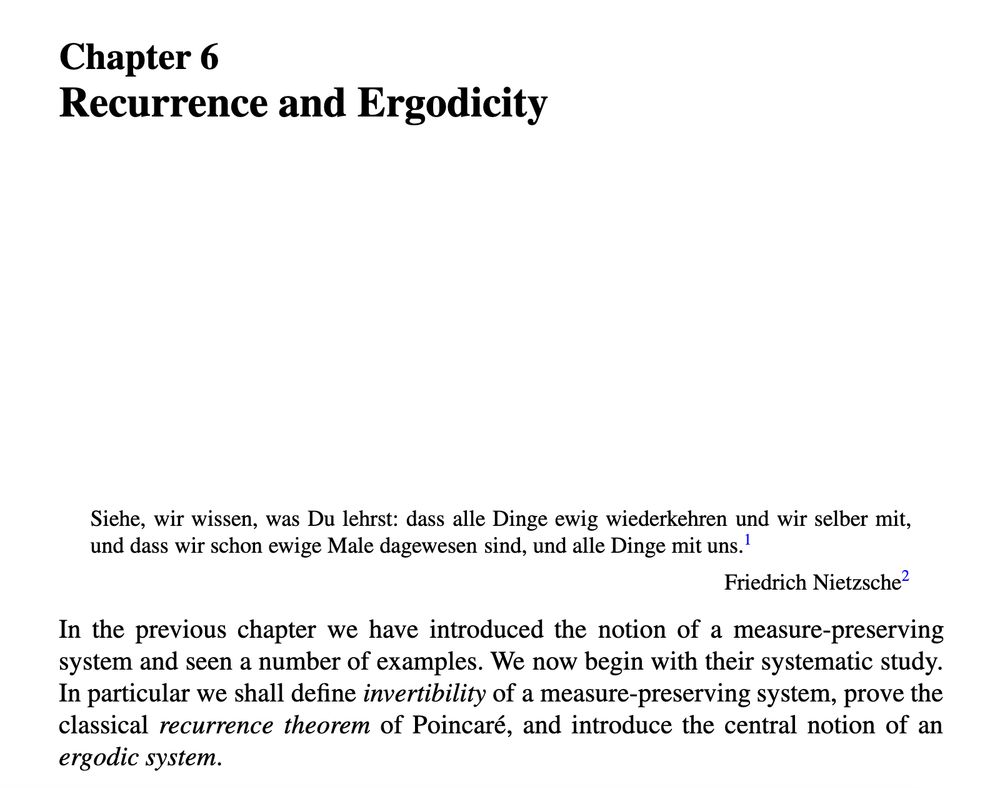
June 5, 2025 at 12:28 AM
Probably a good chapter if it starts with Nietzsche.
- Tanja Eisner, Bálint Farkas, Markus Haase and
Rainer Nagel (Operator Theoretic Aspects
of Ergodic Theory)
- Tanja Eisner, Bálint Farkas, Markus Haase and
Rainer Nagel (Operator Theoretic Aspects
of Ergodic Theory)
Permutation equivariance is a common property of multi-agent systems. In a new paper with Shiba Biswal and
@rishisonthalia.bsky.social
, accepted to ICML, we leverage this property shared by transformers, for mean field models of collective behavior.
#machinelearning
arxiv.org/abs/2410.16295
@rishisonthalia.bsky.social
, accepted to ICML, we leverage this property shared by transformers, for mean field models of collective behavior.
#machinelearning
arxiv.org/abs/2410.16295

Universal Approximation of Mean-Field Models via Transformers
This paper investigates the use of transformers to approximate the mean-field dynamics of interacting particle systems exhibiting collective behavior. Such systems are fundamental in modeling phenomen...
arxiv.org
May 30, 2025 at 3:50 AM
Permutation equivariance is a common property of multi-agent systems. In a new paper with Shiba Biswal and
@rishisonthalia.bsky.social
, accepted to ICML, we leverage this property shared by transformers, for mean field models of collective behavior.
#machinelearning
arxiv.org/abs/2410.16295
@rishisonthalia.bsky.social
, accepted to ICML, we leverage this property shared by transformers, for mean field models of collective behavior.
#machinelearning
arxiv.org/abs/2410.16295
Nice set of notes connecting the finite particle matching problem to the continuum optimal transport solution.
arxiv.org/abs/2505.10175
arxiv.org/abs/2505.10175

From Combinatorics to Partial Differential Equations
The optimal matching of point clouds in $\mathbb{R}^d$ is a combinatorial problem; applications in statistics motivate to consider random point clouds, like the Poisson point process. There is a cruci...
arxiv.org
May 29, 2025 at 4:09 PM
Nice set of notes connecting the finite particle matching problem to the continuum optimal transport solution.
arxiv.org/abs/2505.10175
arxiv.org/abs/2505.10175
It’s known that the Laplacian operator, describing how heat flows through a domain, carries rich information about the domain’s underlying geometry. Similarly, one can understand the geometry of a control system using its sub-Laplacian.
See
comptes-rendus.academie-sciences.fr/mathematique...
See
comptes-rendus.academie-sciences.fr/mathematique...
A linear test for global nonlinear controllability
comptes-rendus.academie-sciences.fr
May 20, 2025 at 11:39 PM
It’s known that the Laplacian operator, describing how heat flows through a domain, carries rich information about the domain’s underlying geometry. Similarly, one can understand the geometry of a control system using its sub-Laplacian.
See
comptes-rendus.academie-sciences.fr/mathematique...
See
comptes-rendus.academie-sciences.fr/mathematique...
Reposted by Karthik Elamvazhuthi
🎙️ New episode! Anders Rantzer (@lunduniversity) walks us through robust control, IQCs, the KYP lemma, nonlinear and hybrid systems, scalability and positivity, and dual (adaptive) control. A journey shaped by the dialogue between Western and Russian control traditions — don’t miss it! 🧠🚀
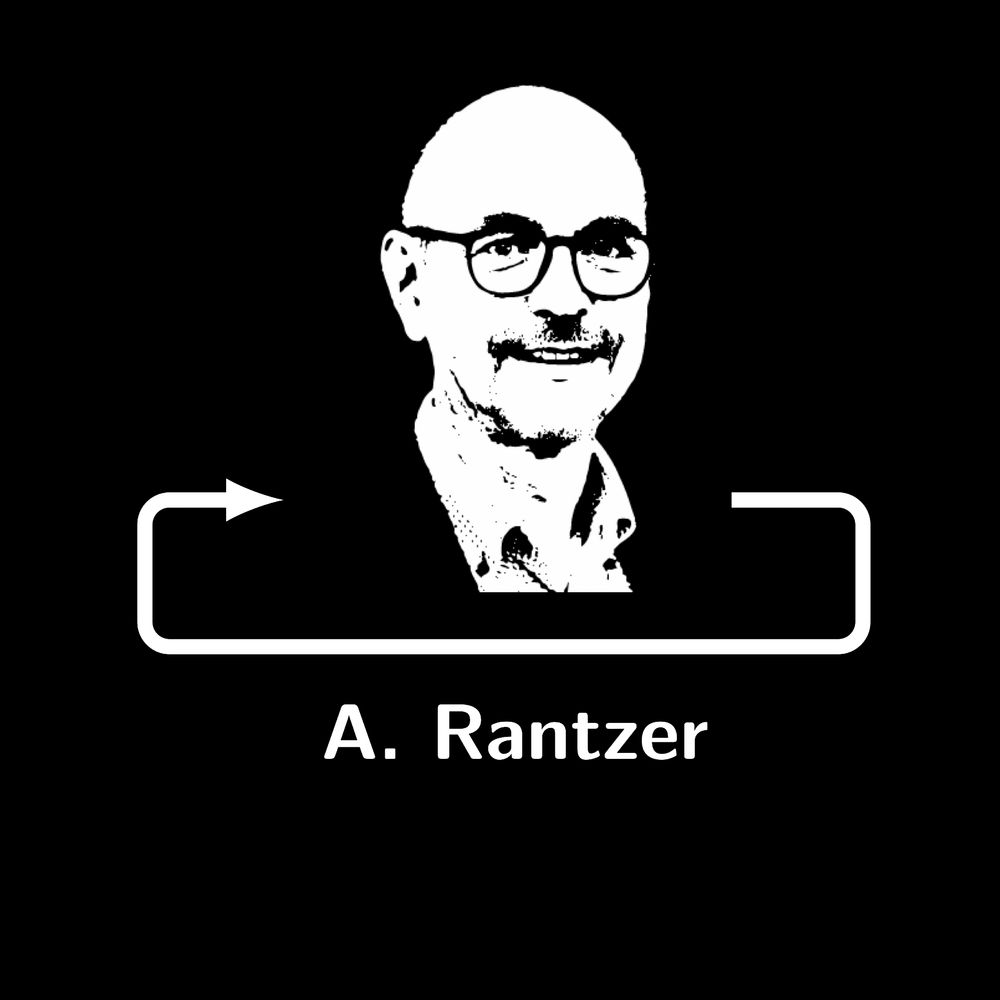
May 16, 2025 at 5:02 PM
🎙️ New episode! Anders Rantzer (@lunduniversity) walks us through robust control, IQCs, the KYP lemma, nonlinear and hybrid systems, scalability and positivity, and dual (adaptive) control. A journey shaped by the dialogue between Western and Russian control traditions — don’t miss it! 🧠🚀
Nice survey on the how optimal control needed some genuine innovations over classical calculus of variation, and how non-smooth tools apply in this setting.
No mention of needle variations, unfortunately.
link.springer.com/article/10.1...
No mention of needle variations, unfortunately.
link.springer.com/article/10.1...
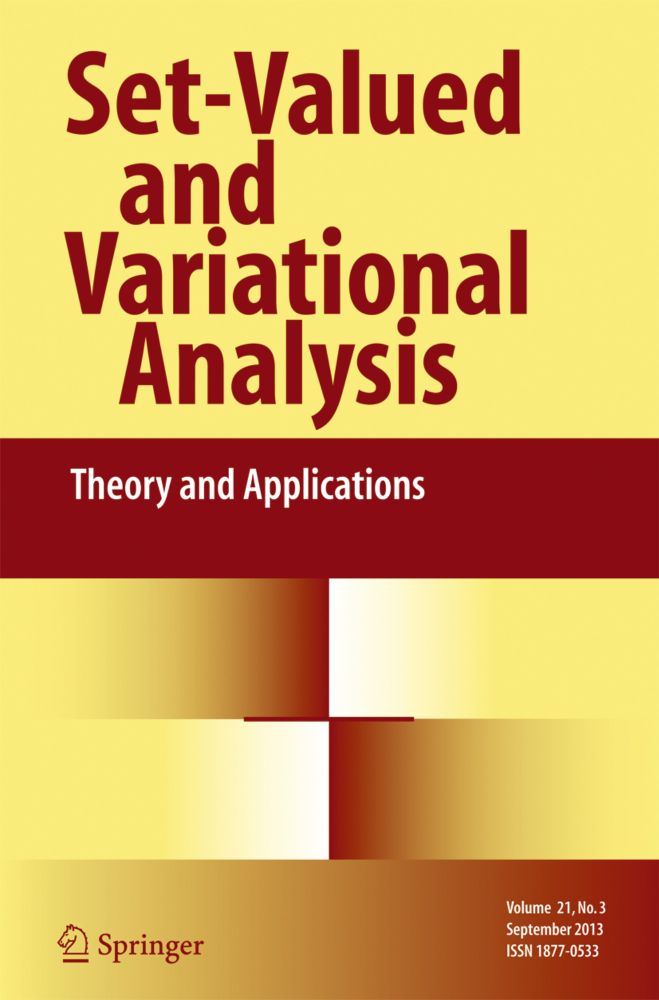
Optimal Trajectories and the Neoclassical Calculus of Variations - Set-Valued and Variational Analysis
The calculus of variations, a venerable subject connected for centuries with physics, was largely superseded in the 1960s by the theory of optimal control that arose then from modern engineering. Math...
link.springer.com
April 25, 2025 at 2:02 PM
Nice survey on the how optimal control needed some genuine innovations over classical calculus of variation, and how non-smooth tools apply in this setting.
No mention of needle variations, unfortunately.
link.springer.com/article/10.1...
No mention of needle variations, unfortunately.
link.springer.com/article/10.1...
If we are not careful, all our jobs will be replaced by conditional probability distributions.
April 20, 2025 at 3:26 PM
If we are not careful, all our jobs will be replaced by conditional probability distributions.
Denoising an unstable double integrator to sum of two Dirac measures.
See details on the theory in the preprint: www.researchgate.net/publication/...
#controltheory #machinelearning #diffusionmodels
bsky.app/profile/clop...
See details on the theory in the preprint: www.researchgate.net/publication/...
#controltheory #machinelearning #diffusionmodels
bsky.app/profile/clop...
April 14, 2025 at 12:50 AM
Denoising an unstable double integrator to sum of two Dirac measures.
See details on the theory in the preprint: www.researchgate.net/publication/...
#controltheory #machinelearning #diffusionmodels
bsky.app/profile/clop...
See details on the theory in the preprint: www.researchgate.net/publication/...
#controltheory #machinelearning #diffusionmodels
bsky.app/profile/clop...
A blog post on how diffusion models can be used for planning in domains with obstacles : hackmd.io/@TAzH1D5uSQO...
April 6, 2025 at 5:31 PM
A blog post on how diffusion models can be used for planning in domains with obstacles : hackmd.io/@TAzH1D5uSQO...
When it comes to optimal transport, think Eulerian and compute Lagrangian. In a new paper, we present a numerical method embracing this philosophy, with potential applications to controlling swarms and sampling.
www.esaim-cocv.org/articles/coc...
www.esaim-cocv.org/articles/coc...
A blob method for mean field control with terminal constraints | ESAIM: Control, Optimisation and Calculus of Variations (ESAIM: COCV)Mendeley
ESAIM: Control, Optimisation and Calculus of Variations (ESAIM: COCV) publishes rapidly and efficiently papers and surveys in the areas of control, optimisation and calculus of variations
www.esaim-cocv.org
March 26, 2025 at 4:23 AM
When it comes to optimal transport, think Eulerian and compute Lagrangian. In a new paper, we present a numerical method embracing this philosophy, with potential applications to controlling swarms and sampling.
www.esaim-cocv.org/articles/coc...
www.esaim-cocv.org/articles/coc...
Why did the robot swarm cross the road? Because, it wasn’t at equilibrium. 🤖 🤖
In a new paper, we prove existence of optimal transport maps between singular measures called equilibrium measures, when the flow is constrained to be a linear control system.
www.sciencedirect.com/science/arti...
In a new paper, we prove existence of optimal transport maps between singular measures called equilibrium measures, when the flow is constrained to be a linear control system.
www.sciencedirect.com/science/arti...
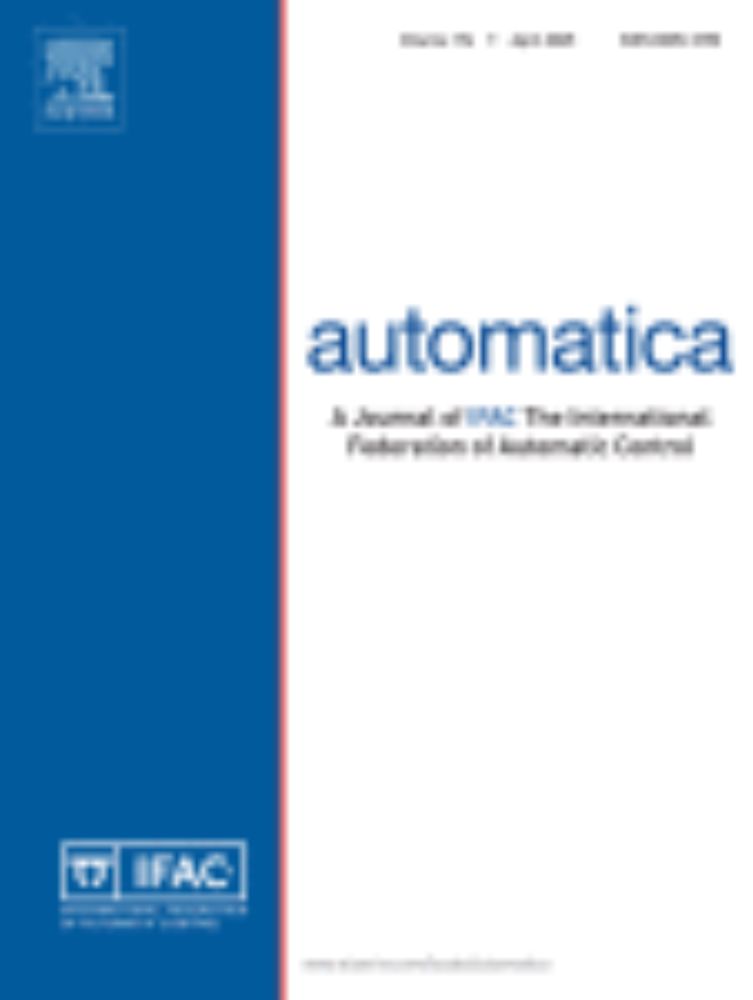
Optimal transport of linear systems over equilibrium measures
We consider the optimal transport problem over convex costs arising from optimal control of linear time-invariant(LTI) systems when the initial and ta…
www.sciencedirect.com
February 27, 2025 at 4:08 PM
Why did the robot swarm cross the road? Because, it wasn’t at equilibrium. 🤖 🤖
In a new paper, we prove existence of optimal transport maps between singular measures called equilibrium measures, when the flow is constrained to be a linear control system.
www.sciencedirect.com/science/arti...
In a new paper, we prove existence of optimal transport maps between singular measures called equilibrium measures, when the flow is constrained to be a linear control system.
www.sciencedirect.com/science/arti...
In case you are interested in alternatives for Google scholar, base seems like a nice option: www.base-search.net
BASE (Bielefeld Academic Search Engine): Basic Search
More than 400 mio. scientific documents from more than 11.000 content providers. BASE is one of the world's most voluminous search engines for academic web resources.
www.base-search.net
January 21, 2025 at 5:21 PM
In case you are interested in alternatives for Google scholar, base seems like a nice option: www.base-search.net
Reposted by Karthik Elamvazhuthi
Women leave academia at higher rates than men at every career stage, and attrition is especially high among three groups: tenured faculty, women in non-STEM fields, and women employed at less prestigious institutions, a #ScienceAdvances analysis finds.
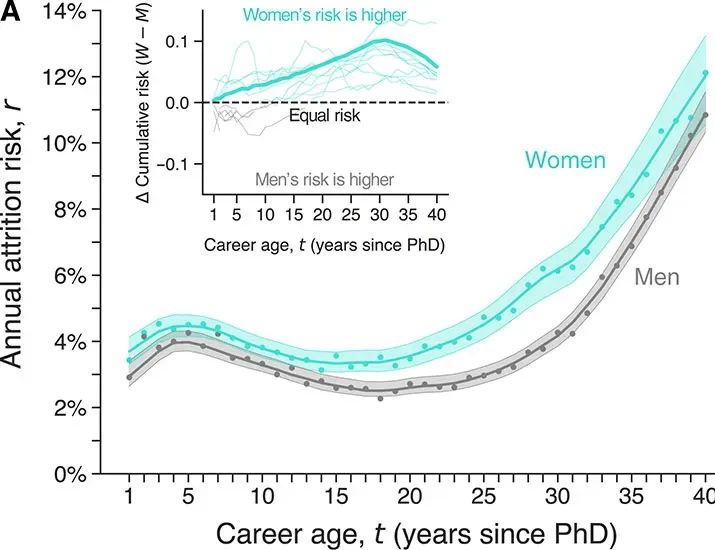
Gender and retention patterns among U.S. faculty
Women faculty are more likely to leave their jobs than men, most often due to workplace climate, rather than work-life balance.
scim.ag
December 23, 2024 at 3:07 PM
Women leave academia at higher rates than men at every career stage, and attrition is especially high among three groups: tenured faculty, women in non-STEM fields, and women employed at less prestigious institutions, a #ScienceAdvances analysis finds.

